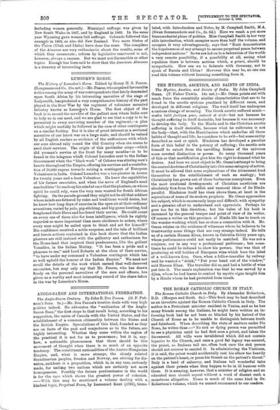ANGLO-SAXON AND INTERNATIONAL FEDERATION.
The Anglo-Saxon Century. By John R. Dos Passos. (G. P. Put- nam's Sons. Os.)—Mr. Dos Passos's treatise deals with very high politics indeed. He advocates the "unification of the Anglo- Saxon Race," the first steps to that result being, according to his suggestion, the union of Canada with the United States, and the establishment of a common citizenship between the States and the British Empire. Speculations of this kind, founded as they are on facts of the past and conjectures as to the future, are highly interesting. Whether they come within the region of the practical it is not for us to pronounce ; but it is, any- how, a noticeable phenomenon that there should be this movement of thought when there is so much of an opposite tendency: The constituent nationalities of the Austro-Hungarian Empire, and, what is more strange, the closely related Scandinavian peoples, Sweden and Norway, are striving for dis- union, and..bere is a proposition, which is, in any case, seriously made, for uniting two nations which are certainly not more homogeneous. Possibly the future predominance in the world Is for the race which shows the greatest power of cohesion. —With this may be mentioned a volume dealing with a kindred topic, Perpetual Peace, by Immanuel Kant (1795), trans- lated, with Introduction and Notes, by M. Campbell Smith, M.A. (Swan Sonnenschein and Co., 2s. 6d.) Here we reach a yet more transcendental plane of politics Miss Campbell Smith in her very able introduction, which occupies more than half the volume, and occupies it very advantageously, says that "Kant demonstrates the hopelessness of any attempt to secure perpetual peace between independent nations." So we are led on to a federation of the world, a very remote possibility, if a possibility at all, seeing what repulsion there is between nations which, a priori, should be sympathetic. How are we to federate with Germany, not to speak of Russia and China ? However this may be, no one can read this volume without learning something from it.


























































 Previous page
Previous page